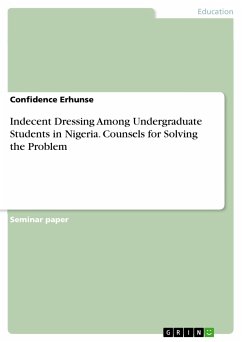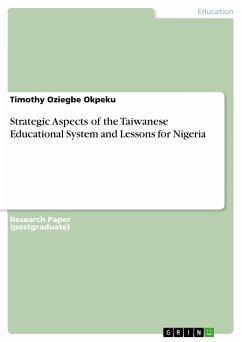Seminar paper from the year 2019 in the subject Pedagogy - Higher Education, grade: 3.5, Chukwuemeka Odumegwu Ojukwu University (DEPARTMENT OF EDUCATIONAL FOUNDATIONS), course: GUIDANCE AND COUNSELLING, language: English, abstract: This paper examines the issue of indecent dressing among undergraduate students in Nigerian tertiary institutions. Indecent dressing is one of the major problems that is eating up our youths, especially female students. The paper looks at meaning and types of indecent dressing, reasons why some student dress indecently and its effects on undergraduates in Nigerian tertiary institutions. Dressing originated from the time Adam and Eve sewed fig leaves and made themselves aprons to cover their nakedness after eating the forbidden fruit. This shows that human beings are social animals blessed with degree of intelligence. Our mental ability enables us to cover nakedness. Therefore, dressing is an act of putting on clothes. Importance of wearing clothe on the body is in order to protect, beautify or adorn it. Clothes are one of the basic necessities of man. In its widest sense, it includes a great range of material that man wears or applies to the body. Clothing includes dresses, shoes, jewellery, hairdo and make- up. Clothing is also used to show people's status and the roles they play in society. The clothes someone decides to wear influences the impression people have about such an individual. It also tells about the family such a person comes from. It can also affect the person's comfort and self-confidence. The dressing pattern of an individual is a kind of "sign language" that communicates a complete set of information and is usually the basis on which immediate impressions are formed. A dress is therefore said to be indecent when it has provocative or stimulating influence on almost all those that happen to view it on the user. Although, there are no universally acceptable ways of dressing, dresses are meant to serve some definable purposes, notwithstanding one's country or region. They are part of people's culture and they define their tribal or ethnic identity. Apart from dresses being a means for cultural identity, they are for ornamental or aesthetic purposes, for protection of the body against harsh weather conditions as well as for covering the intimate part of the body. These purposes are important especially as they form major aspects of a person's personality. Indecent appearance has come to characterize the dress pattern of many students on the campuses of higher learning in Nigeria.
Dieser Download kann aus rechtlichen Gründen nur mit Rechnungsadresse in A, B, BG, CY, CZ, D, DK, EW, E, FIN, F, GR, HR, H, IRL, I, LT, L, LR, M, NL, PL, P, R, S, SLO, SK ausgeliefert werden.









